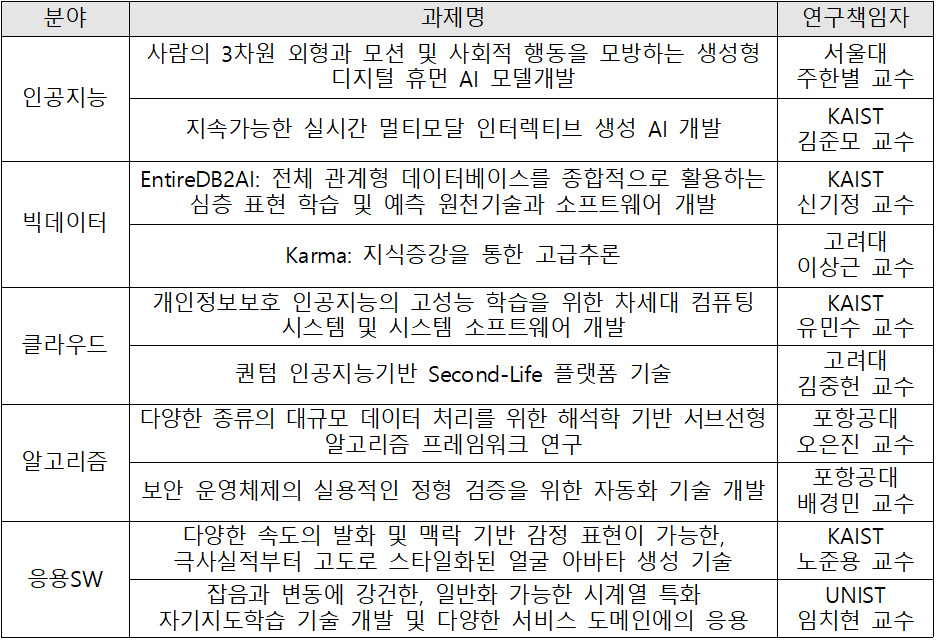과학기술정보통신부(장관 이종호)는 소프트웨어(SW) 분야 우수한 기초·원천기술을 보유한 대학 연구실을 지원하는 2024년도 SW스타랩 사업의 선정 결과 인공지능에서는 △서울대 주한별 교수 △KAIST 김준모 교수, 빅데이터에서는 KAIST 신기정 교수 △고려대 이상근 교수, 클라우드에서는 KAIST 유민수 교수 △고려대 김중헌 교수, 알고리즘에서는 △포항공대 오은진 교수 △포항공대 배경민 교수, 응용SW에서는 △KAIST 노준용 교수 △UNIST 임치현 교수 연구실이 선정됐다.

▲2024년 SW스타랩 선정 결과
AI·클라우드 우수 연구실 최장 8년 지원
정부가 인공지능, 클라우드 등 미래 소프트웨어 기술혁신을 이끌 신규 연구실을 선정하고, 최장 8년간 지원에 나선다.
과학기술정보통신부(장관 이종호)는 소프트웨어(SW) 분야 우수한 기초·원천기술을 보유한 대학 연구실을 지원하는 2024년도 SW스타랩 사업의 선정 결과를 발표했다.
2024년 SW스타랩 선정 결과 인공지능에서는 △서울대 주한별 교수 △KAIST 김준모 교수, 빅데이터에서는 KAIST 신기정 교수 △고려대 이상근 교수, 클라우드에서는 KAIST 유민수 교수 △고려대 김중헌 교수, 알고리즘에서는 △포항공대 오은진 교수 △포항공대 배경민 교수, 응용SW에서는 △KAIST 노준용 교수 △UNIST 임치현 교수 연구실이 선정됐다.
2015년부터 시작한 SW스타랩은 SW 핵심기술 분야의 세계적 기초·원천기술 확보와 함께 글로벌 SW 혁신을 주도할 석·박사급 인재를 양성하는 사업으로, 동 사업에 선정된 연구실은 연구 성과에 따라 최장 8년(4년+2년+2년) 동안 안정적으로 연구에 몰입할 수 있도록 지원을 받는다.
올해 공모에는 20개 대학 총 48개의 연구실이 신청(경쟁률 4.8:1)했으며, 연구의 추진전략 및 우수성, 연구자의 수행 역량 등을 엄중하게 평가하여 고려대, 서울대, 포항공대, KAIST(한국과학기술원), UNIST(울산과학기술원) 등 5개 대학 총 10개의 연구실이 최종 선정됐다. 이번 신규 선정으로 올해는 총 49개의 SW스타랩이 운영된다.
SW스타랩은 작년까지(2015년∼23년) 석사 474명, 박사 218명 등 총 778명의 고급 인력을 배출했으며, 최근 3년간(2021년∼2023년) SCIE급 저널에 연간 60여편의 논문을 게재하고, (최)우수학술대회에서 연간 90여편의 논문을 발표하는 등 우수한 연구 성과를 창출했다.
또한 깃허브(오픈소스 저장소) 등을 통해 연평균 60여건의 공개SW를 전 세계에 공유함으로써 국내 SW 연구의 위상을 높였다.
특히 국제학술대회에서 최우수논문상 수상, 국가 연구개발 100선에 다수 선정되는 등 그 경쟁력과 우수성을 세계적으로 인정받고 있다.
과기정통부 황규철 소프트웨어정책관은 “SW기술은 전 산업에 접목되어 국민의 일상생활에 광범위한 영향을 미치는 중요한 역할을 하고 있으며, 미래 국가 경쟁력의 원천으로서 SW기초·원천기술 연구에 대한 꾸준한 지원은 중요하다”며 “SW스타랩 사업을 통해 대학 연구실이 창의적이고 도전적인 연구를 마음껏 할 수 있는 환경을 만들어 세계적인 성과를 내고 뛰어난 인재를 양성할 수 있도록 지원에 최선을 다하겠다”고 밝혔다.